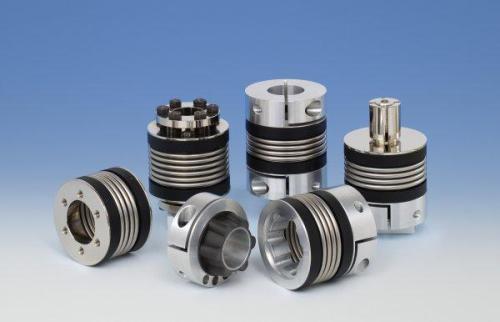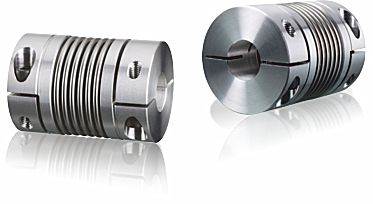Product Description
GR-55×57 Aluminum Alloy GR Rigid Shaft Coupling Bellows Setscrew Coupling
Description of GR-55×57 Aluminum Alloy GR Rigid Shaft Coupling Bellows Setscrew Coupling
>The material is aluminum alloy, and the middle bellows is made of stainless steel with excellent corrosion resistance
>Laser welding is used between bellows and shaft sleeve, with zero rotation clearance, suitable for CHINAMFG and reverse rotation
>Bellows structure can effectively compensate radial, angular and axial deviation
>Designed for servo motor stepper motor
>Fastening method of setscrew
Catalogue of GR-55×57 Aluminum Alloy GR Rigid Shaft Coupling Bellows Setscrew Coupling
|
model parameter |
common bore diameter d1,d2 |
ΦD |
L |
LI |
L2 |
L3 |
N |
F |
tightening screw torque |
|
GR-16×27 |
4,5,6,6.35,7,8 |
16 |
27 |
7.5 |
2 |
8 |
13.5 |
3 |
0.7 |
|
GR-20×32 |
5,6,6.35,7,8,9,9.525,10,11,12 |
20 |
32 |
7.2 |
2.8 |
12 |
18 |
3.5 |
0.7 |
|
GR-22.5×34 |
5,6,6.35,7,8,9,9.525,10,11,12 |
22.5 |
34 |
8.05 |
2.8 |
12.3 |
20.2 |
4.5 |
1.7 |
|
GR-25×37 |
6,6.35,7,8,9,9.525,10,11,12 |
25 |
37 |
9.5 |
3 |
12 |
20.2 |
4.5 |
1.7 |
|
GR-32×42 |
8,9,10,11,12,12.7,14,15 |
32 |
42 |
8 |
4 |
18 |
27.2 |
5.5 |
4 |
|
GR-40×51 |
8,9,9.525,10,11,12,12.7,14,15,16,17,18,19,20 |
40 |
51 |
9.5 |
6 |
20 |
34.5 |
5.5 |
4 |
|
GR-55×57 |
10,11,12,12.7,14,15,16,17,18,19,20,22,24,25 |
55 |
57 |
9 |
6 |
27 |
51.9 |
6.25 |
7 |
|
GR-65×81 |
10,11,12,12.7,14,15,16,17,18,19,20,22,24,25,28,30,32,35,38 |
65 |
81 |
19.5 |
7 |
28 |
60.5 |
8.9 |
7 |
|
model parameter |
Rated torque(N.m) |
allowable eccentricity (mm) |
allowable deflection angle (°) |
allowable axial deviation (mm) |
maximum speed (rpm) |
static torsional stiffness (N.M/rad) |
weight (g) |
|
GR-16×27 |
0.8 |
0.1 |
2 |
-0.8 |
20000 |
150 |
8 |
|
GR-20×32 |
1.5 |
0.1 |
2 |
-1.2 |
18000 |
220 |
13 |
|
GR-22.5×34 |
1.8 |
0.15 |
2 |
-1.2 |
16000 |
300 |
22 |
|
GR-25×37 |
2 |
0.15 |
2 |
-1.2 |
15000 |
330 |
30 |
|
GR-32×42 |
2.5 |
0.2 |
2 |
-1.7 |
11000 |
490 |
53 |
|
GR-40×51 |
6.4 |
0.3 |
2 |
-1.7 |
10000 |
530 |
85 |
|
GR-55×57 |
12 |
0.3 |
2 |
-1.7 |
9000 |
860 |
170 |
|
GR-65×81 |
18 |
0.2 |
2 |
-1.8 |
4500 |
900 |
280 |
/* January 22, 2571 19:08:37 */!function(){function s(e,r){var a,o={};try{e&&e.split(“,”).forEach(function(e,t){e&&(a=e.match(/(.*?):(.*)$/))&&1

Are there Specific Temperature and Torque Limits for Different Bellows Coupling Materials?
Bellows couplings are available in a variety of materials, each with its own temperature and torque limits. The choice of material depends on the specific application requirements, including environmental conditions, operating temperatures, and torque demands. Here are some commonly used bellows coupling materials and their respective temperature and torque limits:
- Stainless Steel: Stainless steel bellows couplings are widely used due to their excellent corrosion resistance and high strength. They can operate in a wide temperature range, typically from -40°C to 400°C (-40°F to 752°F). The torque limits for stainless steel bellows couplings vary based on their size and construction but can range from a few Nm to several hundred Nm.
- Aluminum: Aluminum bellows couplings are lightweight and offer good corrosion resistance. They are suitable for applications with lower torque requirements. The temperature limits for aluminum couplings range from -30°C to 150°C (-22°F to 302°F), and the torque limits generally range from a few Nm to around 50 Nm.
- Brass: Brass bellows couplings are known for their electrical conductivity and are often used in applications where electrical isolation is required. They have temperature limits similar to aluminum couplings, ranging from -30°C to 150°C (-22°F to 302°F), and torque limits comparable to aluminum couplings.
- Titanium: Titanium bellows couplings offer exceptional strength and corrosion resistance, making them suitable for demanding applications. They can operate in a temperature range of -50°C to 300°C (-58°F to 572°F), and their torque limits range from a few Nm to several hundred Nm.
- Inconel: Inconel is a high-temperature alloy that provides excellent performance in extreme heat and corrosive environments. Inconel bellows couplings can operate in temperatures from -60°C to 600°C (-76°F to 1112°F) and have high torque capacities, ranging from a few Nm to over a thousand Nm.
- Plastics: Certain plastic materials, such as PEEK (Polyether Ether Ketone), are used for bellows couplings in specialized applications. Plastic couplings offer lower torque capacities compared to metal couplings but can operate in a temperature range of -30°C to 250°C (-22°F to 482°F).
It is essential to consult the manufacturer’s specifications and guidelines to select the appropriate bellows coupling material for your specific application. Choosing the right material ensures that the coupling can withstand the operating conditions and delivers reliable performance throughout its service life.

What are the Standard Sizes and Dimensions Available for Bellows Couplings?
Bellows couplings come in a variety of standard sizes and dimensions to accommodate different shaft diameters and application requirements. The sizes and dimensions of bellows couplings can vary depending on the manufacturer and specific series of the coupling. However, some common standard sizes and dimensions are as follows:
- Shaft Diameter: Bellows couplings are available in a range of shaft diameters, typically starting from a few millimeters up to several inches. Common sizes include 6mm, 8mm, 10mm, 12mm, 15mm, 20mm, 25mm, 30mm, and larger.
- Length: The overall length of a bellows coupling can vary based on the design and intended application. Standard lengths are usually specified by the manufacturer and can range from around 20mm to over 100mm, with longer versions available for certain applications.
- Outer Diameter: The outer diameter of a bellows coupling is determined by the coupling’s construction and can vary across different models. It is essential to consider the available space and installation requirements when choosing a bellows coupling based on its outer diameter.
- Maximum Torque Rating: Each bellows coupling has a maximum torque rating that defines the maximum amount of torque it can transmit without failure. The torque rating is typically specified in Newton-meters (Nm) or pound-inches (lb-in) and varies between different sizes and materials.
- Maximum Speed Rating: Bellows couplings are rated for a maximum rotational speed, usually expressed in revolutions per minute (RPM). The speed rating is an important consideration for high-speed applications to avoid exceeding the coupling’s critical speed or causing undue stress on the components.
- Material: Bellows couplings can be made from various materials, including stainless steel, aluminum, and other alloys. The choice of material depends on factors such as the application’s requirements, environmental conditions, and the need for corrosion resistance.
It’s important to note that these dimensions and specifications may vary depending on the manufacturer and the specific series or model of the bellows coupling. When selecting a bellows coupling, it is crucial to consider the mechanical and performance requirements of the application to ensure proper fit and optimal performance.

Where can I find reputable suppliers or manufacturers of bellows couplings for my specific machinery requirements?
If you are looking for reputable suppliers or manufacturers of bellows couplings to meet your specific machinery requirements, there are several avenues you can explore:
- Online Directories: Utilize online industrial directories and platforms that specialize in connecting buyers with suppliers. Websites like Thomasnet, Alibaba, and GlobalSpec can help you find a wide range of bellows coupling manufacturers from around the world.
- Trade Shows and Exhibitions: Attend trade shows and exhibitions related to your industry. These events often host numerous suppliers and manufacturers showcasing their products, including bellows couplings. It provides an excellent opportunity to meet the suppliers in person, discuss your specific requirements, and evaluate the products firsthand.
- Industry Associations: Reach out to industry associations and organizations relevant to your field. They can often provide valuable recommendations and a list of reputable suppliers who cater to your machinery needs.
- Referrals and Recommendations: Seek referrals and recommendations from colleagues, business partners, or other professionals in your industry who have experience with bellows couplings. Their insights can help you find trustworthy suppliers.
- Online Research: Conduct thorough online research to identify manufacturers with a strong reputation, positive reviews, and a history of delivering quality products. Check their websites, customer testimonials, and ratings on review platforms.
- Supplier Directories: Some industries have specific supplier directories or databases that provide information about verified suppliers and manufacturers. Consult these directories to find suitable bellows coupling suppliers.
When evaluating potential suppliers, consider factors such as product quality, pricing, lead times, customer support, and the ability to customize products to meet your machinery’s specific requirements. It’s also essential to request samples, product catalogs, and quotes from multiple suppliers to make an informed decision.
Always choose a supplier with a track record of delivering high-quality bellows couplings and excellent customer service to ensure a successful partnership for your machinery needs.


editor by CX 2024-03-29
